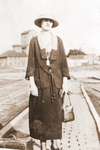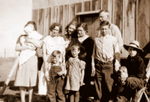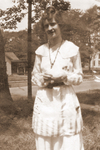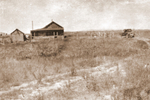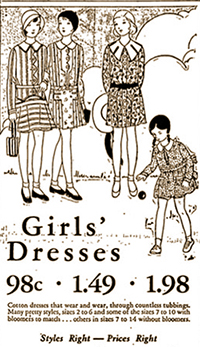 |
|||||
|
|||||
Ethel Edith Smith Taylor |
|||||
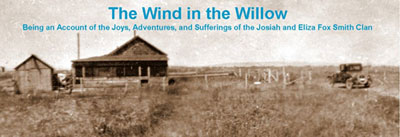 |
|||||
Ethel Taylor Writes from Sundance, Wyoming on August 30, 1992 |
You have all been so nice to say such lovely things about me. Afraid I'll get a little bit conceited. Guess I better put this on the table so I can write. I have all my brothers and sisters put to shame for outliving them all. I do miss them all a great deal. As the older you get, your memory constantly goes backwards to your childhood days. Truly, I am so thankful I still have quite good health and most of my marbles (I guess). Still do a great deal of all kinds of handwork. Many people are so unhappy when moving to home. Not me. To be sure, it's hard to give up all those belongings the good Lord has provided you with, but the place for you is where they can care for you. So I am real fortunate. I have a small good home. It's more like a family. [I get] very good care. So I'm just as happy and content as can be. Many people here [are] much younger, but arthritis and broken bones keep them from being busy. |
Doris Taylor holding Ruth Taylor, Ethel behind Jim Taylor, Maryon White behind Marjorie Taylor, Eil Taylor behind John Taylor, Donald White.
|
|||
Maryon White's Memories of her Aunt Ethel, January 17, 1992
|
Ethel Edith, the fifth child of Josiah and Eliza [Fox] Smith was born August 20, 1894, which made her 97 years old in 1991. Her longevity is not the only noticeable thing about this truly remarkable lady. In an era when most young ladies demurely bowed to parent domination, Miss Ethel emancipated herself in her teens. When [her father] Josiah decided to move to Minnesota, Ethel declined to accompany the family, much to Josiah's dismay. She stayed in Red Oak where she had a good job and lived in a rooming house with friends. And a good thing she did, because she became a refugee in short order. I was also confused about how Ethel met her future husband, and how well she knew him before they decided to marry. I thought she had met him on a vacation visit to Bertha, and that she renewed her acquaintance on a later visit. They exchanged letters etc. etc. etc. Instead she tells me that she spent nearly a year with Bertha and Elmer and learned to know and respect Eil Taylor at that time. I thought she had jumped into a totally strange and unknown life style, but if she was with Kimseys for a year, she had a pretty good idea of ranch life. I digress not to tell you a little about Eil. He and his brother came up from Texas when both were quite young. One of his first jobs was driving a supply wagon to sheepherders. This, of course, did not endear him to the cattlemen of the area since this was in the midst of the "war" between cattlemen and sheepmen. And some of the cattlemen never forgot this early "sin"! Twyla told me that he could tell very interesting stories about the period-seeing sheepherder wagons burned, herds of sheep deliberately scattered or destroyed, etc. I personally never heard him talk much. I thought he was a very stern and silent man, but I was used to my gabby uncles, I guess. I know he had all of us kids totally buffaloed. I remember one time we were happily playing on a straw stack-or maybe a hay stack when we spotted him coming across the field. We had been told to stay away because of the danger of snakes, but we did not realize his concern. I don't think he did or said anything, but we did not play there again, ever. I wonder what he'd have done if he knew of our adventures in the nearby canyon. Donald [White] and John [Taylor] would tie ropes to the saddle horns of their horses and "rappel" down over the sandstone rim-rock. They could easily have been killed, but they thought they were courageous cowboys. Meanwhile, Doris and I would be creeping through the narrow crevices in the rim-rock, or exploring a slightly hollowed out area that we called a cave. We, too, could have been bitten by snakes or crushed by falling rocks. Guess the good Lord truly does protect fools and small children. I don't know just how Eil got the ranch. Whether he had homesteaded or bought someone else's claim, but the original log cabin was moved from some spot down in or near the canyon I mentioned. The first I remember it had grown to a 5 room house with a big screened porch, but that was a gradual development. Ethel and Eil were married in the fall of 1922, and in the fall of 1923, their first child was born. My parents were there at the time, and Twyla told of Bill going off on old Hammer (a plow horse) to get the doctor. I can't imagine why he went on a horse when they had arrived in a car, but maybe roads were impassable (not uncommon in Crook County) Doris Dean was the oldest, John Edward next (1925), Marjorie Ann (born around 1931) James Luther and Ruth Louise. I don't know of anyone in our family, or anyone else's family, for that matter, who had more heartbreaking things happen than Ethel and yet she survived and maintained a wonderful philosophy which I have tried to emulate. [The] Alcoholics Anonymous Serenity Prayer sums it up pretty well: God Grant me the Serenity to accept the things I'm sure that all of these tragedies were extremely hard to accept, and I'll not dwell on them, but remind you that 1. In the mid thirties, they lost their home for a number of reasons I will speculate on later. Still Ethel has maintained her equilibrium and presents a very cheerful face to the world. Those of you who were at the reunion in 1987 will remember that Doris had died only a few weeks prior to it, yet Ethel had told us to go ahead and have the reunion. Doris and Virginia and Bill had worked so hard planning it, and she felt Doris would want us to go ahead. You will remember that Ethel attended every single event with a pleasant smile on her face. That takes courage. I've mentioned before that Ethel was, and still is, a very beautiful lady. Naturally, she had many, many beaus. Her stories and the stories told by her younger brothers and sisters are quite different, but perhaps the younger ones had very vivid imaginations, and I don't know why Ethel should fib about it. Imagine having 2 brothers and 2 sisters who inspected every gentleman caller, delivered their opinion on each one, and hung unflattering nicknames on many. One of my favorite stories is about "Mittens." Ethel says she went out with him only once, the younger kids had her practically married to him, but all agreed he was pretty dopey. I also heard many stories about a character called "Ding Dawson," but Ethel claims she never dated him at all. She does admit that one night after her date arrived she went into the bedroom to get her coat and hat. In the process, she managed to kick the chamber pot! Those things were made of crockery or metal and always had lids which rattle and rattled and rattled. You can imagine the clatter it made, the near hysterical reaction of the younger kids, and the embarrassment of the young lady and her beau. No wonder she married someone those kids could not comment on! The early years at the ranch were good ones: plenty of rain, plenty of hard work and good results. Twyla told of the fabulous gardens Ethel raised, their cellar house full of hams and slabs of bacon, and a very rosy future was anticipated. In 1926, the Taylors had a good car, plenty of money and time to take a long trip. Possibly the only really good vacation they ever had. They went clear down to Texas to visit Eil's relations, then back to Iowa to visit Ethel's relations. In the early 30s things still looked good. Ethel and Eil took in our family and fed and clothed us for many months. I particularly remember gorgeous red sheepskin coats for Doris and me, and aviator caps (complete with goggles) for John and Donald. Things started to go bad soon after that, however. As in more recent years in the Midwest, the bankers encouraged Eil to overextend himself. They even came out to the ranch to talk to him. Eil invested in sheep and bought some machinery. And then came the bad years! Grasshoppers, drought, grasshoppers, more drought, really bad times for everyone and the Taylors lost the ranch. Our lot had improved considerably and when Josiah died, my Dad was able to pay up back taxes or whatever it took to gain title to that place. Some of the Smith brothers and sisters were pretty unhappy about it, but no one else seemed to have the money. Now when Taylors gave up on the ranch, my Dad was able to acquire that property too. I don't know the ins and outs, but I don't think Taylors ever harbored any hard feelings about it. I don't think Eil ever went back after they left the place, but Ethel was very good to Donald and all of us all the time we had the place. I remember one time we were all out there when a bad rainstorm came. Ethel baked biscuits three times a day and couldn't fill us up. We ran out of food and borrowed from the nearest neighbors, and finally my Dad walked 18 miles into town. As soon as the mailman could get over the roads, Dad rode out with big boxes of groceries. We had lots of good times on the Taylor place. Donald was in Wyoming when Taylors moved to town. Eil had obtained a job managing a gas station in Moorcroft, and Ethel worked every bit as hard as he did to make a go of it. It was a good thing she learned the business, because after Eil died, she was on her own. She managed to keep running the station for several years. When John and Jim got better jobs, she gave up the station and went to Sheridan where Doris was living. She got a job as matron at the "Girls School" [which was a]fancy name for reformatory. What a job! But she claims she really enjoyed it. Even after she retired from that job, at age 65, she continued to do many wonderful things for her loved ones. After my Dad died and I realized that Twyla could not be left alone, Ethel came out and stayed with Twyla during the school year for several years. She really was a blessing, and it was wonderful to have a good supper waiting when I came home from work. She did lots of special things for us, including mending. And here I will have to insert a little story about a dress that needed shortening. I asked Ethel to fix it, but when I tried to wear it, it was still too long. Again she shortened it and again it was still too long. This went on for several times before we discovered that she was shortening one dark cotton print and I was trying on another somber dark cotton print. Anyway, I had a nice new blouse out of the deal. This reminds me of the dresses Ethel and Gus used to make for Twyla Mae, Doris, and me. Sometimes they would make three dresses just alike, but more often they would just send the dresses around to another one of us. Most of them were lovely, but one, a blue and yellow plaid simply did not appeal to any of us. That dress went the rounds about 3 times before we all thankfully grew out of it. And I must tell you about the black sateen bloomers Ethel dreamed up for us to wear. At that time, little girls dresses came about 2 inches above the knees. Then you were supposed to wear matching or contrasting bloomers over your underpants. The bloomers were supposed to hang down a bit below the hem of the skirt. Ethel decided that black would be a nice practical color that would go with everything, so she made a bunch of black bloomers. She wasn't about to have us grow out of them, so they turned out to be more like knickers than bloomers. No matter how high you hoisted the elastic on the legs, those blamed bloomers hung down below our knees! She will tell you they were supposed to be just for play, but all three of us remembered wearing those blasted things every day. Ethel also went and spent several months with Gus when Raymond was so desperately ill. It seemed to mean a lot to Raymond that Ethel be there with Gus. Ethel has often said that she wished she had gone back to stay with Gus after Raymond died. After Doris died, in 1982, Ethel moved back to Moorcroft to the cute little house where she lived after Eil died, and it was only recently (maybe 3 or 4 years ago) that she realized she should not try to live alone anymore. She seems very contented her new home, and is well liked by all the staff and other patients. She knows everyone in the county of course, so in addition to her own family and friends who come to visit, she frequently sees casual acquaintances when the come to visit other patients. When I went back to visit her in the fall of 1990, I fully expected to spend the time watching TV or doing handwork there in her room. Much to my surprise, she had her suitcase packed and said she could go anywhere I wanted to go. We really had a great time! Now remember she was 95 years old, but we went to Buffalo to visit Bob and Dorothy [Kimsey] Smith, we went to Sheridan to go to Doris's grave and to visit Ethel's old neighbor in the apartment where she had lived. We toured most of the country roads in Crook County and she knew just who had lived where and what kind of parties they had. We went to the Devil's Tower, went out to the Taylor Place, etc., etc. We stayed in motels and ate in restaurants and did exactly as we pleased for a week. We put 1500 miles on the rental car I had picked up in Rapid City. When we were at the ranch we had a long visit with the present owner, and he showed us an old hand plow he had found somewhere on the place. He really seemed to value it, and Ethel said it brought back memories of the early days. She used to lead the horse who pulled the plow, while Eil walked behind and steered or controlled or operated or drove or whatever you do to a plow when you are breaking virgin sod. Not an easy Task. That week was an unforgettable time for me. I shall always treasure these memories. I talk to Ethel nearly every week and she is as sharp and alert as can be. We are very lucky to have a lady like this in our background. |
||||
Bill Smith's Memories of his Aunt Ethel, Bend, Oregon , February 2, 1992
|
Aunt Ethel had some good years not marked by the depression, bankruptcy, unemployment, homelessness, child sickness, child death, the war, hard work, social put down, and general poverty that did not allow such gratuities as knowing where the food was coming from for the next month. These untarnished years occurred before about 1930-31 approximately. She had arrived from Iowa, met a handsome bachelor who owned a ranch upon which they did very well. They owned livestock, a new 1928 Chevy, a house and so on. My Dad [Bryan Smith] said that we walked out of Red Oak, Iowa in 1928 when hard times struck and we went to Sioux City, but that we crawled out of Sioux City. I asked him what he meant by that. He said we were staying in Sioux City with no job and Uncle Eil and Aunt Ethel sent him the train fare to come to Moorcroft. Dad always liked Uncle Eil and had a lot of respect for him. After we arrived in Moorcroft, Uncle Eil set Dad up on the old Summer's place, later called the Shoemaker place, then the Petersen place, and got a loan from the Sundance Bank for another tractor (as I understand it). Well, that's about when the depression and the drought hit Wyoming, both were of greater intensity than has occurred at any other time in the history of the U.S. I recall being on the Taylor place when I was about 6-7 years old. I walked through what had been a wheat field about 100 yards from the house. The grasshoppers hit your face so hard you could hardly walk. All that remained of the wheat was a thin stubble about 6 inches high. Besides the loan from the bank, Uncle Eil took out a government rehab loan to survive and couldn't pay it back. They lost the ranch. Since we had left the shed house in granddad's old place, the Taylors moved over there temporarily since there was no other place to go. Uncle Eil was in a state of shock, a wife and 5 small children, past middle age, no job and no prospects. Uncle Eil was the silent type, not good when you need help. Fortunately Aunt Ethel can talk, in fact she can be a spellbinder on occasion. She negotiated with Roy Thompson, local school board head and North Dakota Morgan, Superintendent of Gillette, to take school board money due any family with kids and more. Aunt Ethel took the kids to go to school in Gillette for a year or two. Uncle Eil stayed on the ranch, a hopeless endeavor. Then Aunt Ethel heard about an opportunity at a filling station in Moorcroft. She talked the owner of a filling station chain into letting Uncle Eil manage this station. So they all moved into Moorcroft and into the station. In the early years at the filling station Marjorie got sick, a prolonged illness, tumor on the brain, an operation that made things worse, than death. At the same time, Jim got sick, very sick, and came to our place to live in bed. Gradually he recovered. No one knows what was wrong, but he did come close to death. No doctor in town. Things were not easy then. Grocery bills didn't get paid, but when the war came, Aunt Ethel seized an opportunity to survive. Gas was rationed and you had to have coupons to buy gas. Some didn't use all their coupons so Aunt Ethel collected extra coupons and when truckers came through in the middle of the night and had to have gas, they soon discovered who would get out of bed at 1:00 AM, give them gas and cover it with coupons; it was Aunt Ethel. After the war, Uncle Eil died of a heart attack and Aunt Ethel managed the station with John and Jim's help for many years. One of the high, high points in Aunt Ethel's life was when Ruthie, at an age of about 3-4 won a beauty contest. I don't believe Aunt Ethel ever escaped trouble until she finally retired. It is well know that several of her children have gone before, and others have suffered illness. Through all of this, I can never remember her losing her composure, of not being able to think, not being able to make the best solution in a bad situation, of compensating for trouble by eating, or drinking, smoking or swearing. She handles stress better than anyone I know. My best memory of Aunt Ethel is a selfish one. When I was about 4 years old and we were at Taylor's ranch, she was fixing us homemade bread with homemade butter on it. When my turn came, she buttered my bread and then looked at me quizzically with a smile and said "Would you like more butter?" I said yes and she laid it on real thick! |
|
|||
Joan Smith Irwin's Memories of her Aunt Ethel, Seattle, Washington, 1992
|
My first memories of Aunt Ethel go back to 1929 when our family came to Wyoming from Sioux City, Iowa. I was six years old then and did not have a very good understanding of the complexities of our lives. In the beginning Aunt Ethel was the mother of Doris and John and Jim and Marjorie and Ruthie. Uncle Eil died and Marjorie died and I began to slowly realize what that woman was actually doing the impossible! As the years went by she was beset by more and more trials and tribulations and became stronger and stronger because of it. She never mentioned religion to me, but I believe that she is the only person I know who embodies the basic original philosophy of all major religions: that of acceptance of a higher power. The rest of us just fake it. At 97 years young, she's the smartest one in the family, has a beautiful sense of humor and is a delight to be around. In the past few years, her philosophy of life and example has contributed immensely to my well being. I'll share my memories of my Aunt Ethel and her family because they are intertwined in my life. [I remember] two little three year old girls, sitting on the steps between the living room and dining rooms at the Taylor ranch on the divide, Marjorie and I playing with our dolls. Bryan and Eil [were] visiting behind us in the living room. [I remember] the murmur and laughter of women in the kitchen cooking [and] the smell of roast meat and the delicious aromas tickling our noses as the cold air came in from outside. The older kids were washing up on the porch then coming into add voices and laughter to the gathering of the families. I've forgotten the occasion, but it was one of many during my life. My Aunt Ethel was a marvelous cook. She could make the best brown gravy, turkey dressing and chocolate cake. She always pooh-poohed any compliments and said she didn't have a recipe when I asked for them. She made it seem so easy to feed as many as 16 to 20. But most of all, she always had time to listen to children. Even with the hustle and bustle she would stop and listen to the younger children and she continues to listen as she always has. It was a hot Wyoming summer afternoon, probably a Sunday. It was so much fun going to the icehouse to find the pieces of ice hiding in the sawdust. They were making ice cream. The boys and men were sitting on the steps of the screened-in porch of the ranch house. John would turn the handle, then Jack or Bill. Uncle Eil and my Dad were adding the ice and salt. When Uncle Eil would go to the icehouse, the ice chips would fly and hide in the sawdust. Marjorie and I would wait until they weren't watching and slip in the icehouse to get the chips, wipe off the sawdust and suck the ice. It tasted wonderful to us as four or five year olds. In the middle of the dishing up of the ice cream Jimmy fell down and was screaming loudly. Everyone rushed to see what happened. When things calmed down, we went back to the ice cream of which there was none. The sheep dog was headed under the icehouse licking his chops, fully satisfied. One memory triggers another. The Christmas I was given a little oak rocking chair, I was probably about 2½ or so. The Taylor family and Bryan's family were in the log house of Josiah Smith's. My strong memory was crying hysterically because I had to let Marjorie sit in my new rocking chair. One of the few times I remember being mad at Marjorie. After Marjorie passed away, I didn't spend quite so much time at the Taylor house. Then when Jimmy got into high school he and I had more in common and became good friends as well as cousins. Many Sunday afternoons in my teenage years were spent with Aunt Ethel sitting in the living room at the station: she in the chair by the window to watch the front for customers at the service station. She would listen and counsel me. She, I'm sure, has never had a psychology course, but she has an excellent understanding of human nature. When I would complain about someone she would say "Now Joan, You're a bigger person that than and she (or he) can't help that little flaw." One of her saving graces is her sense of humor. Jimmy inherited her ability to mimic people. She could quite often see the funny side of an otherwise sorry situation. I'm looking forward to attending her 100th birthday party. I'll be there with bells on, and that's a promise. |
|
|||
| Lillian Smith's Memories of her Sister-in-law, Ethel, February 22, 1992 | The first time I met Ethel was when she was on the way to the Mayo clinic with her daughter. She had a few minutes in Sioux City. Just talked to her at the station. We took a vacation and went through Wyoming. Our daughter Kathryn was with us and while visiting Ethel, her son Jim took my daughter and I to see Devil's Tower, buffalo herd and an old Soloon. Don't recall what it was called. Ethel made a big gingerbread cake and served it with real whipped cream. My husband said the girls will not get back in time for cake, so I will eat theirs. He enjoyed every piece, but that was off limits for that much sweets. Ethel stayed with us for some time here in Portland. She taught my daughter to crochet and make different edgings. |
||||
| Shelley Mitchell's Memories of her Great-aunt Ethel, Kneeland, California, April 1, 1992 |
I remember visiting Aunt Ethel when I was about 16. Our family went to Moorcroft and we all stayed with someone different and she got me. She sent me to the store for something and when I got there, the person working there said "Mrs. Taylor called and she wants a couple more things." I remember being amazed that he not only knew who she was, but knew who I was. I figured that she must be really important and famous. Later I found out that she is important and famous! We spend a wonderful evening looking at family photos and hearing the stories that went with them. It started my interest in my history and made me feel secure in my place in the family. | ||||
|
|||||
|
©Roberta Tuller 2025
|
|||||
